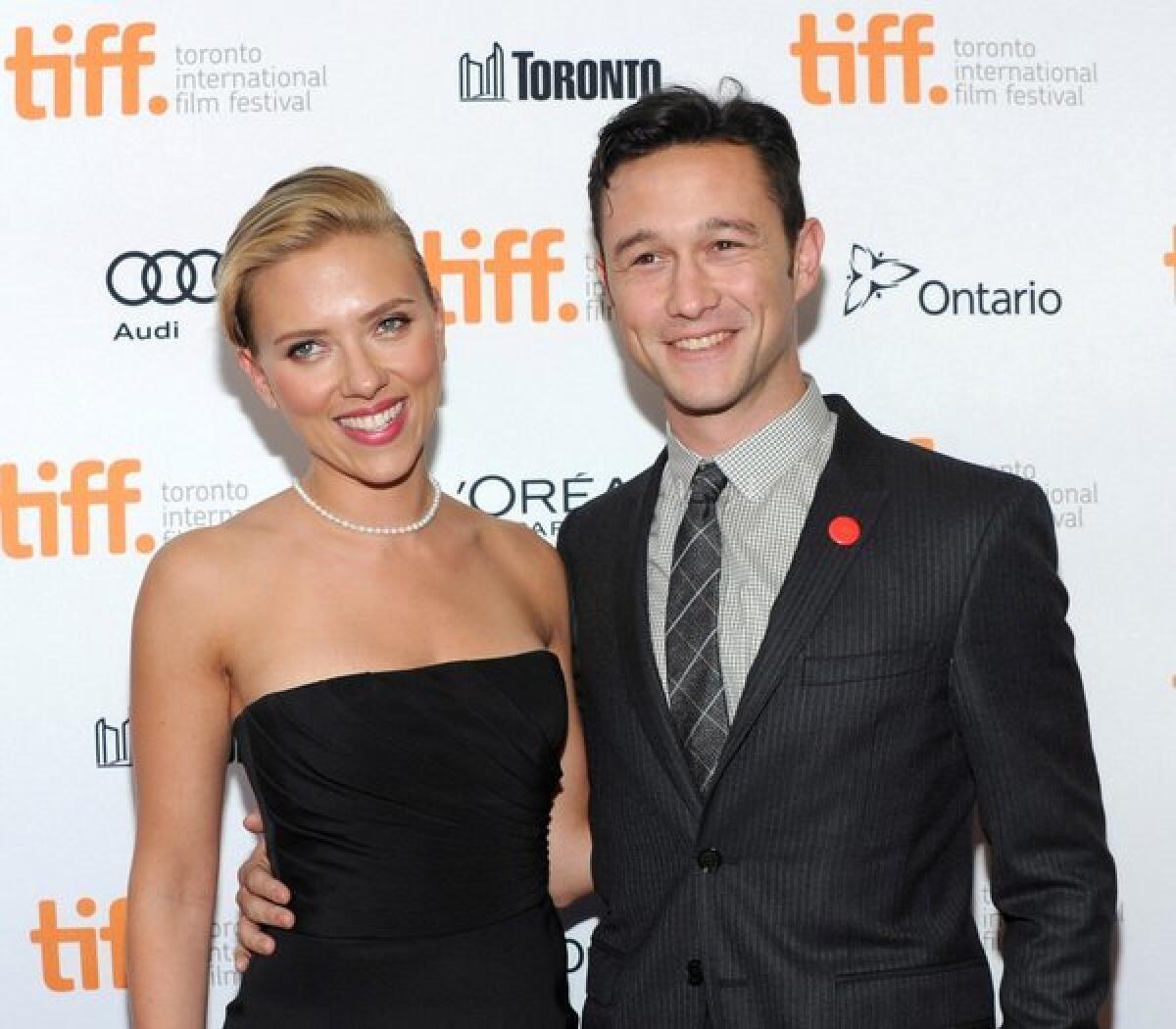Joseph Gordon-Levitt’s ‘Don Jon’ ‘a movie about mainstream culture’

- Share via
After an exhausting-looking media blitz of on-demand charm by Joseph Gordon-Levitt, the film “Don Jon” opens wide in theaters this weekend. Having successfully made the transition from a career as a child actor to an enviable array of roles in recent movies such as “Looper,” “Lincoln” and “The Dark Knight Rises,” the 32-year-old makes his feature debut as writer and director with “Don Jon.”
In the film, Gordon-Levitt plays Jon Martello Jr., a New Jersey native who has a way with the ladies but still finds something more satisfying in the blotted efficiency of online pornography. He meets a woman, Barbara Sugarman (Scarlett Johansson), whose worldview is shaped by Hollywood romances and who sets about trying to mold Jon into the man she thinks he should be. He also meets an earthy, somewhat older woman (Julianne Moore) with a more organic view of human relationships.
The pornography as portrayed in the film is there both for its more straightforward use-value mode, but also as something of a scouting party on how technology is changing the ways in which people interact and connect (or don’t) with one another.
PHOTOS: Joseph Gordon-Levitt | Career in pictures
“I actually think that for me, that’s a lot of what I was thinking about, believe it or not, when I was coming up with the story,” Gordon-Levitt said during a recent Q&A as part of the Los Angeles Times’ Indie Focus Screening Series. He was joined at the event by the film’s editor, Lauren Zuckerman, cinematographer, Thomas Kloss and composer, Nathan Johnson.
“I wanted to center the story around the way media influences how we see the world,’ Gordon-Levitt added, “and I think especially when it comes to love and sex and relationships we often develop unrealistic expectations based on these fantasies that we see on screen.
“I thought a funny way of telling the story would be a boyfriend and a girlfriend where he’s watching too much pornography and she’s watching too many romantic Hollywood movies. It’s a comedy of errors, they keep missing each other because they’re not really engaging with each other, they keep comparing the other to these fantasies.”
For a movie so focused on pornography, as well as the emotional redemption of a character who starts off in a place of unconsidered masculinity, the film has done surprisingly well with female critics, earning positive reviews from Betsy Sharkey in the Los Angeles Times, Manohla Dargis in the New York Times, Claudia Puig in USA Today, Mary Polls in Time and Stephanie Zacharek in the Village Voice.
PHOTOS: Hollywood backlot moments
The film’s rhythmic, stylized montages of images drawn from actual pornography are deftly cut together to make many viewers think they are seeing more than they really are. (The film is rated R.)
“We wanted it to not be an objective look at, ‘Oh, now we’re watching this guy watching pornography,’” said Gordon-Levitt. “We wanted it to be more inside the perspective of this person who is objectifying the women on the screen. These sequences are all pretty heavily composed and specifically planned out and finding the actual clips of pornography was very tedious, it took [freaking] forever.
“It was about the right balance of finding something that wasn’t too gross, that you could understand why the character is finding it appealing, that also demonstrates what is problematic about pornography.”
One could have approached the material with a more dramatic tone, particularly given some of Gordon-Levitt’s headier ideas percolating within it, but he opted instead to convey the story very much in the form of a broad comedy.
“They say laughter is the best medicine,” Gordon-Levitt noted. “If I was going to make a movie and put all the time and work and love and care into writing and directing a movie, I wanted to put something out there that was meaningful to me but I also wanted to connect with lots of people.
“This is a movie about lots of people, it’s a movie about mainstream culture, it’s a movie about a sort of normal American guy, and so I wanted mainstream culture and normal American people to see it. And be entertained by it. It’s a movie after all; it’s not an essay and I’m not a professor. What I’m really good at is knowing how to make a room full of people laugh. That’s what I grew up doing. So that’s what I wanted to do.”
ALSO:
Director Jim Mickle sinks teeth into ‘We Are What We Are’
‘Night Moves’ marks Kelly Reichardt’s take on action-thriller
‘We Gotta Get Out of This Place’ actress Mackenzie Davis breaks out
Follow Mark Olsen on Twitter: @IndieFocus
More to Read
Only good movies
Get the Indie Focus newsletter, Mark Olsen's weekly guide to the world of cinema.
You may occasionally receive promotional content from the Los Angeles Times.











